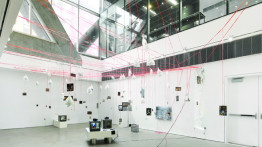The Benjamin Menschel Fellowship Program

Plant Doctor by Ginger Jingzhe Fan A’25, Evan Chiang AR’25, and Arthur Lee AR’25 focuses on developing a more environmentally conscious path toward agricultural cultivation in Taiwan.
The Benjamin Menschel Fellowship Program to Support Creative Inquiry was endowed by a grant given to The Cooper Union by the Horace W. Goldsmith Foundation in 1994 to support work in the fields of art, architecture, design, and engineering. This generous grant was intended to provide funding to exceptional students who propose scholarly, independent projects that will in some way provide a culmination to their educational endeavors at The Cooper Union. The Goldsmith Foundation hopes that the students designated as Benjamin Menschel Fellows will be encouraged by their awards to complete bodies of artwork, develop scientific protocols, or otherwise further their intellectual investigations in a manner that will provide inspiration and illumination to the community as a whole.
Current Events
- 2026 Exhibit, running from Feb 10 – Feb 26
- 2025-2026 Application and Guidelines
Program Supporting Research that Changes How We See
The Menchel Fellowship supports research that crosses boundaries, whether between disciplines, between Cooper Union and the wider world, or between specialized knowledge and shared experience. Projects often begin with technical questions and open into cultural ones, or vice versa. Research emerges through careful attention, where initial questions lead to unexpected insights.
Fellows receive funding to pursue their inquiries over roughly half an academic year. This support enables work that might not find a home within normal coursework: extended observation, travel to specific sites, experimental methods, sustained dialogue with communities. The fellowship welcomes both individual and group proposals, with special emphasis on collaborations across Cooper's three schools.
What Makes a Menschel Project?
- It pursues questions that matter beyond individual disciplines
- It makes visible what is usually overlooked or taken for granted
- It creates dialogue between technical and cultural understanding
- It transforms research methods from one field into tools for another
- It builds bridges between specialized knowledge and shared experience
The fellowship culminates in a public exhibition where fellows share not just results, but the journey of their research. The individual investigations become opportunities for broader conversations.
Eligibility
- Cooper Union students who will be enrolled the following academic year
- Must have completed at least one year at Cooper Union
- Individual or group applications welcome
- Projects must be independent from graded coursework, including thesis/senior projects
Timeline of Fellowship
Each fellowship cycle runs roughly half a year, with fellows selected in Late Spring of one academic year, and concluding with an exhibition at the start of the Spring semester the following academic year.
- Application Deadline: Mid Spring
- Fellows Announced: Late Spring
- Research Period: Summer–Early Fall
- Consolidation of Research: Fall
- Exhibition: Late January-Early February
Past Projects
View the archive of Menschel Exhibition Catalogs and list of previous projects.
Ready to Apply?
2025-2026 Application will be due March 6.
Application Guidelines
Application Form
Questions?
Contact Buck Wanner Director, Benjamin Menschel Fellowship Program
menschel.fellowship@cooper.edu




